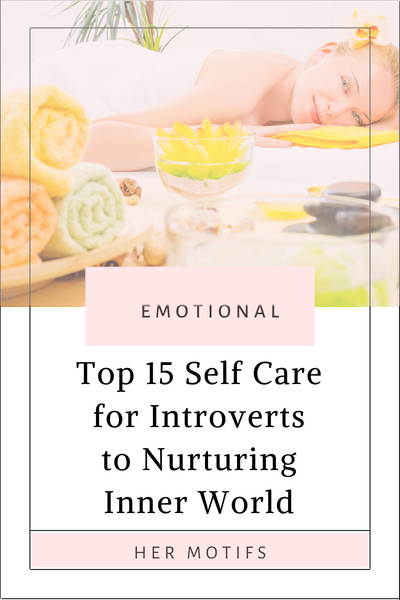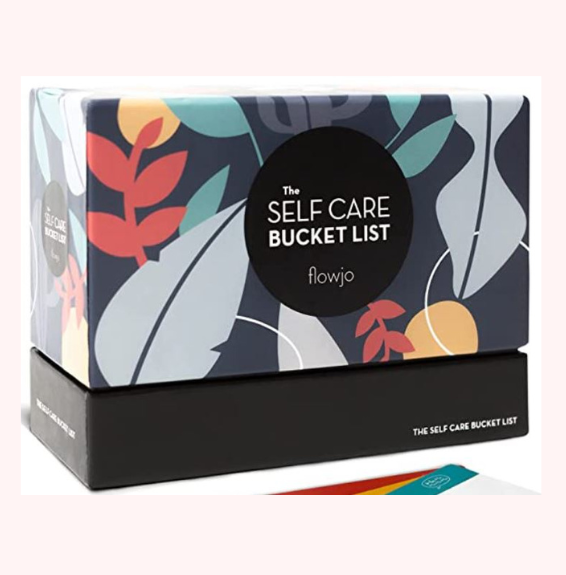Top 15 Self Care for Introverts: Nurturing Your Inner World
 Self Care for Introverts is the intentional practice of attending to one’s needs for solitude, reflection, and quiet time in order to recharge and maintain well-being.
Self Care for Introverts is the intentional practice of attending to one’s needs for solitude, reflection, and quiet time in order to recharge and maintain well-being.
Introverts, who gain energy from within and can be easily overwhelmed by external stimuli, require self-care strategies that honor their natural inclination for introspection and limited social interaction.
It involves creating a peaceful and nurturing environment, engaging in activities that align with their preferences, setting boundaries to protect personal space and energy, and prioritizing rest and rejuvenation.
Self-care for introverts is about embracing and celebrating their unique temperament, honoring their need for solitude, and nurturing their inner world to achieve balance and overall well-being.
Introverts possess a unique and rich inner world, a place of deep thoughts, creativity, and self-discovery. While they often thrive in solitary or low-stimulation environments, the demands of daily life can sometimes overwhelm their sensitive nature. This is where self-care for introverts comes into play—a deliberate and thoughtful practice that nurtures their inner world and helps them maintain a sense of balance
Whether you’re an introvert seeking to prioritize your well-being or someone who cares about an introvert in your life, these tips will provide valuable insights into nurturing and cherishing the quiet power of introversion.
.
Table of Contents
Tools to Loving Selfcare
Self care is Self Love. There is no greater attribute or habits that will enrich you when it comes to self nurturing. Self care is all about taking the time to curate habits or routines that put your best interests at the forefront. Below are some of our favorites
.
.
1. Dedicate Alone Time
Introverts recharge by spending time alone. Carve out regular periods for solitude and reflection to replenish your energy.
It involves intentionally setting aside moments to be by oneself, away from external distractions and social interactions. This allows introverts to recharge, reflect, and engage in activities that bring them joy and peace, below are some examples:
- Solo Retreat: Introverts can plan a mini retreat for themselves, whether it’s a day trip to a serene location or a weekend getaway. This dedicated time away from daily responsibilities provides an opportunity for introspection, relaxation, and pursuing personal interests.
- Quiet Time Rituals: Creating daily rituals that involve quiet and solitude can be incredibly rejuvenating for introverts. This could include setting aside a specific time each day for activities like reading, journaling, meditation, or engaging in a hobby that brings a sense of calm and fulfillment.
- Nature Walks: Spending time alone in nature can be deeply nourishing for introverts. Taking leisurely walks in natural surroundings allows them to connect with the peacefulness of the outdoors, providing an opportunity for reflection, rejuvenation, and a break from the demands of social interactions.
By dedicating alone time, introverts can honor their need for solitude and recharge their energy, promoting a sense of well-being and balance in their lives.
.
2. Engage in Quiet Activities
Pursue activities that align with your introverted nature, such as reading, journaling, painting, or listening to soothing music.
Engaging in quiet activities is an important aspect of self-care, especially for introverts who thrive in calm and peaceful environments. These activities allow for introspection, relaxation, and rejuvenation.
- Reading: Reading is a wonderful way for introverts to escape into different worlds, gain knowledge, and find solace in the quiet. Whether it’s fiction, non-fiction, or self-help books, reading offers an opportunity for mental stimulation, emotional connection, and a break from external stimuli.
- Artistic Pursuits: Engaging in artistic endeavors such as painting, drawing, writing, or playing a musical instrument can be deeply satisfying for introverts. These creative outlets provide a means of self-expression, allowing introverts to channel their emotions, thoughts, and ideas into tangible forms while enjoying the tranquility of the process.
By engaging in quiet activities, introverts can create a space for themselves to unwind, reflect, and recharge. These moments of tranquility and self-expression are essential for maintaining balance and nurturing their inner world.
.
3. Practice Mindfulness
Develop a mindful practice, such as meditation or deep breathing exercises, to center yourself and cultivate inner calm.
Practicing mindfulness is a valuable self-care practice that can bring numerous benefits to one’s well-being, particularly for individuals seeking inner peace, mindset abundance and a deeper connection with the present moment. Mindfulness involves paying attention to the present moment with non-judgmental awareness.
- Body Scan Meditation: This practice involves systematically directing your attention to different parts of your body, observing any sensations or tensions without trying to change them. Start from your toes and work your way up to your head, noticing any areas of tightness or relaxation.
- Mindful Eating: Rather than rushing through meals, bring mindfulness to your eating experience. Slow down and savor each bite, noticing the flavors, textures, and smells of the food. Pay attention to your body’s hunger and fullness cues.
By incorporating mindfulness into your self-care routine, you can cultivate a greater sense of calm, clarity, and presence in your daily life.
.
4. Set Healthy Boundaries
Protect your personal space and energy by establishing boundaries that allow you to limit social interactions and prioritize your needs.
Setting healthy boundaries is an essential aspect of self-care that helps protect your mental, emotional, and physical well-being.
- Saying No: Learn to say no when you need to prioritize your well-being. It’s okay to decline invitations, requests, or responsibilities that overwhelm you or don’t align with your needs.
- Communicating Your Needs: Clearly express your needs and expectations to others. Be open and honest about what you require to feel balanced and supported. Whether it’s requesting alone time, setting limits on work hours, or asking for help, effective communication can help prevent resentment and foster healthier relationships.
- Protecting Your Personal Space: Create physical and emotional boundaries that promote a sense of safety and privacy. This can include carving out designated relaxation areas in your home, setting screen time limits to disconnect from technology, or establishing quiet hours for uninterrupted rest.
Applying healthy boundaries allows you to create a more balanced and fulfilling life. It empowers you to prioritize self-care, respect your own needs, and foster healthier connections with others. Remember that setting boundaries is an ongoing practice that requires self-awareness, assertiveness, and the willingness to prioritize your own well-being.
.
5. Choose Meaningful Social Connections
Nurture a small circle of close and trusted friends or family members who understand and appreciate your introverted nature.
Choosing meaningful social connections is an important aspect of self-care that allows introverts to foster deep and meaningful relationships that align with their needs and values. This examples include:
- Selective Socializing: Instead of trying to maintain a wide circle of acquaintances, focus on building deeper connections with a few individuals who truly understand and support you. Seek out like-minded people who share similar interests, values, and perspectives.
- Prioritize Intimate Gatherings: Introverts often thrive in small, intimate settings where they can engage in more meaningful conversations and connections. Instead of attending large social events that may drain your energy, opt for smaller gatherings or one-on-one meetups that allow for deeper and more personal interactions.
- Engage in Shared Activities: Choose social activities that align with your interests and passions. Engaging in shared hobbies, such as joining a book club, participating in a volunteer group, or attending workshops or classes related to your interests, can help you connect with others who share your enthusiasm.
By choosing meaningful social connections, introverts can create a supportive network of individuals who understand, respect, and appreciate their need for solitude and meaningful interactions. These connections can provide a sense of belonging, support, and emotional nourishment, enhancing overall well-being and self-care.
.
6. Create a Cozy Sanctuary
Curate a calming and comfortable environment at home where you can retreat and recharge.
Creating a cozy sanctuary is an essential aspect of self-care for introverts, as it provides a peaceful and rejuvenating environment where they can recharge and find solace. Here are three examples of how to create a cozy sanctuary for self-care:
- Personalize Your Space: Infuse your living space with elements that bring you comfort and joy. Decorate with soft, warm colors, incorporate cozy textures like blankets and pillows, and display cherished items or photographs that hold sentimental value.
- Designate Relaxation Areas: Create specific areas in your home where you can retreat and unwind. Set up a cozy reading nook with a comfortable chair, soft lighting, and a collection of your favorite books. Dedicate a corner for meditation or mindfulness practice, with cushions or a yoga mat, calming scents, and perhaps a small fountain or plants.
- Incorporate Nature Elements: Bring the soothing presence of nature into your sanctuary. Open your curtains or blinds to let natural light in, add potted plants or fresh flowers to bring life and freshness to your space, and consider incorporating natural materials like wood or stone into your decor.
By creating a cozy sanctuary, introverts can have a dedicated space where they can retreat, recharge, and find comfort amidst the busyness of life. This sanctuary serves as a refuge, allowing introverts to indulge in activities they enjoy and find peace and tranquility.
.
7. Explore Creative Outlets
Express yourself through creative pursuits like writing, drawing, crafting, or playing a musical instrument.
Exploring creative outlets is an excellent form of self-care for introverts, as it allows them to express themselves, tap into their imagination, and find joy in the process. Below are some of our favorites activities:
- Artistic Expression: Engage in activities such as painting, drawing, or sculpting. Use colors, shapes, and textures to create artwork that reflects your emotions and inner thoughts. Experiment with different mediums and techniques to explore your artistic abilities and find a sense of fulfillment in the creative process.
- Writing and Journaling: Put your thoughts and feelings onto paper through writing or journaling. This can be in the form of personal reflections, creative writing, or even poetry. Allow your words to flow freely without judgment, and use this outlet as a way to process emotions, capture moments, or simply let your imagination run wild.
- DIY Projects: Get hands-on with do-it-yourself (DIY) projects. Whether it’s crafting, woodworking, or knitting, engage in activities that involve creating something tangible. The process of planning, designing, and bringing a project to life can be both satisfying and therapeutic.
Exploring creative outlets provides a means for introverts to tap into their inner world and express themselves authentically. Remember, the goal is not perfection or external validation, but rather the joy and fulfillment that come from engaging in activities that resonate with your unique self.
.
8. Practice Self-Reflection
Engage in introspection and self-reflection to deepen your self-awareness and understand your thoughts and emotions better.
Practicing self-reflection is a valuable self-care practice for introverts as it allows them to gain self-awareness, understand their emotions and thoughts, and make conscious choices aligned with their values. Three examples of how to incorporate self-reflection into your self-care routine:
- Journaling: Engage in regular journaling sessions to explore your thoughts, feelings, and experiences. Write freely without judgment, allowing your thoughts to flow onto the pages. Use journaling prompts or reflect on specific events, challenges, or goals to gain insights into your patterns, triggers, and aspirations.
- Self-Assessment and Goal Setting: Take time to assess your personal and professional goals, values, and priorities. Reflect on your strengths, areas for growth, and what truly matters to you. Set realistic and meaningful goals that align with your values and aspirations. Regularly review your progress, celebrate accomplishments, and make adjustments as needed.
This allows introverts to create space for introspection, gain valuable insights, and make conscious decisions in alignment with their values and needs. It provides an opportunity to nurture self-awareness, cultivate personal growth, and enhance overall well-being.
.
9. Prioritize Quality Rest and Sleep
Recognize the importance of quality sleep and create a soothing bedtime routine to ensure you are well-rested and rejuvenated.
Prioritizing quality rest and sleep is essential for self-care, especially for introverts who may be more sensitive to external stimuli and benefit from ample downtime. Examples includes:
- Establish a Bedtime Routine: Create a relaxing routine before bed to signal your body and mind that it’s time to wind down. Engage in calming activities such as reading a book, taking a warm bath, or practicing gentle stretches. Avoid screens and stimulating activities that can disrupt sleep.
- Create a Restful Sleep Environment: Pay attention to your sleep environment and make it conducive to rest. Ensure your bedroom is cool, quiet, and dark. Invest in a comfortable mattress, pillows, and bedding that support a restful sleep.
- Establish Healthy Sleep Habits: Maintain a consistent sleep schedule by going to bed and waking up at the same time each day, even on weekends. This helps regulate your body’s internal clock and promotes better sleep quality.
Quality rest and sleep is crucial for maintaining overall well-being and supporting optimal functioning. By making restful sleep a priority, introverts can ensure they have the necessary physical and mental energy to navigate their lives with vitality and balance.
.
10. Embrace Nature
Connect with the natural world by spending time outdoors, going for walks, or simply sitting in a park to soak in the serenity and beauty of nature.
Embracing nature as part of self-care can be especially beneficial for introverts, as it provides an opportunity to recharge and find solace in the natural world. How to embrace nature for self-care:
- Spend Time in Green Spaces: Make it a point to spend time in green spaces such as parks, gardens, or forests. Take leisurely walks, sit under a tree, or simply immerse yourself in the beauty of nature. Being surrounded by greenery has been shown to reduce stress, boost mood, and improve overall well-being.
- Engage in Outdoor Activities: Participate in outdoor activities that align with your interests and preferences. This could include hiking, biking, gardening, birdwatching, or simply exploring new natural settings. Engaging in physical activities outdoors not only promotes physical health but also offers an opportunity to disconnect from the digital world, clear the mind, and enjoy the sensory experiences of nature. It allows introverts to find inspiration, peace, and a sense of grounding.
By embracing nature, introverts can tap into its restorative power and find a sense of peace, inspiration, and connection. Nature provides a nurturing space for self-reflection, introspection, and recharging, supporting the overall well-being and self-care needs of introverts.
.
11. Engage in Solo Hobbies
Pursue individual activities that bring you joy and fulfillment, such as hiking, photography, gardening, or cooking.
Engaging in solo hobbies is an excellent way for introverts to practice self-care and recharge their energy. These activities allow introverts to focus on their individual interests and passions, providing a sense of fulfillment and enjoyment. Solo hobbies for self-care:
- Reading: Reading is a popular solo hobby that allows introverts to immerse themselves in different worlds, expand their knowledge, and explore their imagination. Whether it’s fiction, non-fiction, or self-help books, reading offers a quiet and introspective escape.
- Painting or Drawing: Engaging in visual arts like painting or drawing can be a therapeutic and meditative experience for introverts. It allows them to express their creativity, channel their emotions, and find a sense of calm and focus.
- Writing or Journaling: Writing or journaling is a powerful self-care practice for introverts. It provides a safe space to process thoughts and emotions, reflect on experiences, and explore personal growth. Whether it’s keeping a gratitude journal, writing poetry, or capturing daily thoughts, writing helps introverts gain clarity, release stress, and foster self-awareness.
Engaging in solo hobbies allows introverts to honor their need for solitude, recharge their energy, and find joy in activities that align with their individual interests. These pursuits offer a sense of personal fulfillment, creative expression, and a valuable opportunity for self-care and self-discovery.
.
12. Practice Saying No
Learn to decline invitations or requests that do not align with your needs or drain your energy, allowing yourself the freedom to prioritize your well-being.
Practicing the art of saying no is an essential aspect of self-care for introverts. It involves setting healthy boundaries, honoring personal needs, and avoiding excessive commitments or obligations that can drain energy and cause overwhelm. Examples of practicing saying no for self-care:
- Declining Social Invitations: Introverts may feel pressured to attend numerous social events or gatherings, which can be mentally and emotionally exhausting. By politely declining invitations when necessary, introverts can prioritize their alone time and recharge their energy reserves.
- Setting Work Boundaries: In the workplace, introverts may face challenges with excessive workloads, long hours, or constant interruptions. By learning to say no to additional tasks or requests that go beyond their capacity, introverts can protect their well-being and maintain a healthy work-life balance.
- Establishing Personal Time: Introverts thrive on solitude and introspection. It’s crucial for them to carve out dedicated personal time for relaxation, self-reflection, and pursuing their own interests. By saying no to distractions or unnecessary commitments during their personal time, introverts can prioritize self-care activities such as reading, taking walks, practicing mindfulness, or engaging in creative hobbies.
By practicing the art of saying no, introverts can create space for themselves, protect their energy, and prioritize self-care. It allows them to maintain a healthy balance between social interactions, work responsibilities, and personal time, ensuring they have the necessary energy and mental well-being to thrive in all aspects of life.
.
13. Limit Social Media
Set boundaries around technology use to avoid overstimulation and ensure you have ample time for introspection and self-care activities.
Limiting social media and screen time is an important self-care practice for introverts in today’s digital age. It helps in creating a healthier balance between online interactions and real-life experiences, reducing the potential negative impact of excessive screen time on mental and emotional well-being. Some examples includes:
- Setting Screen Time Boundaries: Introverts may find themselves easily immersed in social media or screen-based activities, which can lead to feelings of overwhelm or isolation. By setting specific time limits for social media usage and consciously reducing screen time, introverts can reclaim valuable time for more fulfilling activities that align with their needs, such as reading, journaling, engaging in hobbies, or spending quality time with loved ones.
- Creating Digital Detox Periods: Taking regular breaks from social media and screens can be rejuvenating for introverts. It allows them to disconnect from the constant stimuli and pressure of online interactions, giving them a chance to recharge and reconnect with themselves.
By consciously limiting social media and screen time, introverts can create a healthier relationship with technology, protect their mental and emotional well-being, and find more balance in their lives. It allows them to allocate time and energy to activities that truly nourish their inner world, foster meaningful relationships, and support their self-care journey.
.
14. Practice Self-Compassion
Be kind to yourself, embrace your introverted nature, and acknowledge your unique strengths and needs.
This involves treating oneself with kindness, understanding, and acceptance, especially during challenging or difficult times. Here are three examples of how practicing self-compassion can enhance self-care for introverts:
- Embracing Imperfections: Introverts often have high expectations of themselves, which can lead to self-criticism and self-judgment. By practicing self-compassion, introverts can learn to embrace their imperfections and recognize that it’s okay to make mistakes or have limitations.
- Setting Boundaries and Saying No: Introverts may feel the pressure to accommodate others’ needs or social expectations, even if it compromises their own well-being. Self-compassion empowers introverts to set healthy boundaries and prioritize their own needs without guilt or self-blame.
- Cultivating Self-Care Rituals: Engaging in self-care activities is an essential aspect of self-compassion. Introverts can practice self-compassion by intentionally carving out time for self-care rituals that replenish and nourish their mind, body, and soul. This can include activities like journaling, meditation, taking relaxing baths, enjoying a favorite hobby, or spending time in nature.
Practicing self-compassion allows introverts to cultivate a compassionate and supportive relationship with themselves. It helps them navigate their inner landscape with kindness and understanding, fostering resilience, self-acceptance, and overall well-being.
.
15. Honor Your Energy Levels
Listen to your body and recognize when you need to take breaks or recharge. Honor your natural rhythm and pace, allowing yourself the space to rejuvenate when necessary.
It involves recognizing and respecting your own needs for rest, solitude, and recharge. Here are three examples of how you can honor your energy levels:
- Listen to Your Body: Pay attention to your body’s signals and cues throughout the day. Notice when you start feeling drained, fatigued, or overwhelmed. Honor these signals by taking breaks, engaging in calming activities, or simply allowing yourself to rest, in addition keep an active lifestyle. By listening to your body’s needs, you can prevent burnout and replenish your energy reserves.
- Create a Balanced Schedule: Structure your days in a way that supports your energy levels. Allocate time for tasks, interactions, and activities that align with your natural rhythms. For example, if you know that you need quiet mornings to recharge, schedule important or challenging tasks for later in the day.
- Set Realistic Expectations: Recognize your limits and set realistic expectations for yourself. Avoid overcommitting or taking on more responsibilities than you can handle. Give yourself permission to say no to things that drain your energy or go against your well-being.
Honoring your energy levels as an introvert allows you to create a self-care routine that respects your unique needs. It empowers you to prioritize self-care activities, establish healthy boundaries, and make choices that support your overall well-being.
.
Conclusion
Being an introvert has many wonderful elements that can truly be enriching to yourself and also to those around you. There are numerous ways to apply selfcare elements that meets your personality.
Remember, self-care is not selfish but a necessary practice that allows you to thrive and bring your best self to the world. Embrace these self-care practices, customize them to your needs, and enjoy the journey of nurturing your inner world as an introvert.
.
- 100 Valentine Lovers Questions - February 24, 2025
- 2025 New Year Growth Quotes - February 24, 2025
- 2025 Inspiring Self Love Quotes - February 24, 2025















